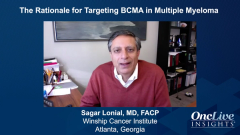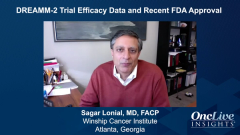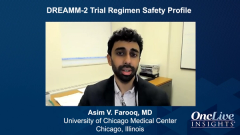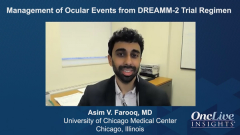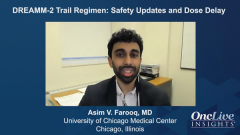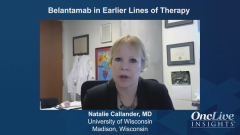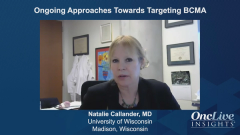
Treatment Approach for R/R Multiple Myeloma
Episodes in this series

Sagar Lonial MD, FACP: Of the challenges we have struggled with in caring for patients who have seen multiple lines of therapy, of particular note are patients who are triple-class refractory or resistant to the proteasome inhibitors, immunomodulatory agents, and CD38 antibodies. Our treatment options are fairly limited at that point. Often, we will recycle previous agents in different combinations and hope we can get responses. Alkylator-based therapy, such as cyclophosphamide or melphalan, may be agents that we bring into play in this context. Combination chemotherapy approaches such as VDT-PACE [bortezomib, dexamethasone, thalidomide, cisplatin, doxorubicin, cyclophosphamide, etoposide] or DCEP [dexamethasone, cyclophosphamide, etoposide, cisplatin], may be treatments that we use as well, but unfortunately all those recycling or chemotherapy-based approaches have a limited life span. In all likelihood, you usually get 30 to 60 days of those treatment approaches. It has been new drug approvals and access to clinical trials that have really made a difference for patients with refractory myeloma.
What we know about patients who have reached the triple-class refractory stage of myeloma is that their median expected prognosis or survival is somewhere between 6 and 11 months. This has been demonstrated in a couple of retrospective analyses looking at daratumumab-resistant patients, such as in the MAMMOTH study as well as in the work of Dr Ajay Nooka from our group at Winship Cancer Institute, who demonstrated that the median overall survival for patients in this category is quite short. That is where we begin to look at the efficacy of new drugs. Can they really push the boundary of median overall survival in addition to response?
When we begin to think about what the treatment options are for patients who have had 4 or more prior lines of therapy, functionally, their condition is triple-class refractory. They are resistant to proteasome inhibitors, they are resistant to IMiDs [immunomodulatory drugs], and they are resistant to anti-CD38 antibodies. There are potential options in addition to recycling previously used agents or chemotherapy-based approaches. One approach that was recently approved is belantamab mafodotin, or belamaf, and this is 1 recent approach using an antibody-drug conjugate targeting BCMAs [B-cell maturation antigens] that provides significant potential benefit for patients.
The other agent in this situation is the use of selinexor, which is a first-in-class XPO1 inhibitor. Selinexor was combined with dexamethasone in the STORM trial and was FDA approved for a similar pretreated patient population. There are some challenges to both of these medications, but with appropriate supportive care this can be used. It is important to recognize that the ongoing, unmet medical needs include management of patients who are frail, patients who have renal insufficiency, and patients who developed oligo-secretory myeloma, because unfortunately many of these patients are not eligible for clinical trials. Their treatment options in the refractory myeloma setting can be quite limited.
One of the things that we do when we try to assess what treatment approach might be suitable for a patient with refractory myeloma is to understand what their current symptom burden is and how much of that symptom burden is related to myeloma vs comorbid conditions that may or may not get better. What other specific issues such as travel, co-pays, and distance from the clinic impact patients’ treatment? All those things play into those decision-making processes. It is important to recognize that not all patients with 4 or more prior lines of therapy are going to be able to take aggressive therapy. Trying to understand how you tailor the treatment approach to what they need is 1 of the clinical challenges we struggle with in this situation.
Transcript Edited for Clarity


